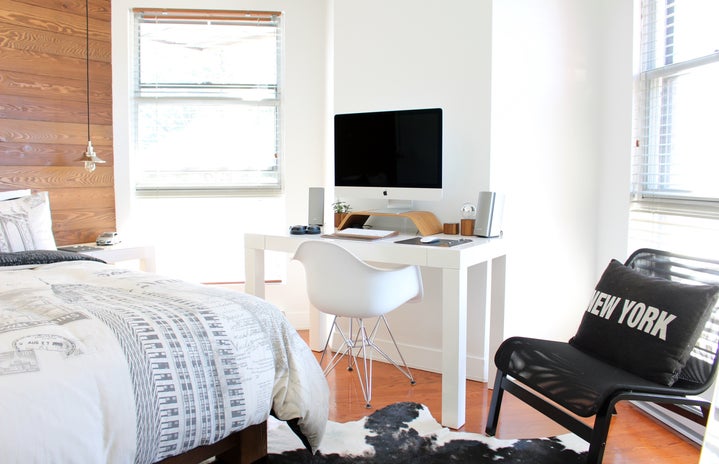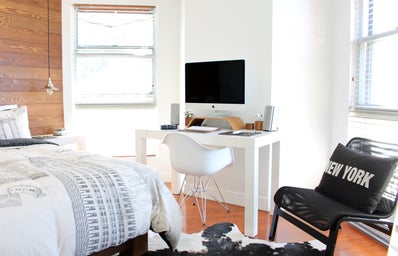Whether you’re about to find roommates for the school year or you’ve graduated and refuse to move back in with your family, it’s important to learn how to live independently. Your parents’ house, dorms, and apartments are all very different environments. Paying your own bills and putting your name on contracts seems exciting (or terrifying) in theory, but do you really know what you’re getting into?
Let’s start with bills. If you’ve graduated, you probably have a job lined up or you’re at least looking for one. If your parents aren’t paying your bills anymore, you obviously need your own money. Get yourself a bank account if you don’t already have one. Cash is cool and all, but it’s easy to lose. You can’t cancel a thief’s payment with your money if it gets stolen. Checking accounts make it easy for a lot of employers to pay you anyway through direct deposit. It also may be cheaper for you to put your paychecks (or any physical check) into your account with your bank rather than cashing a check at a store. Once you have your income figured out, you can start budgeting. Figure out what you can’t live without. If that’s too expensive for you, repeat and cut down on what you can. Bills for water or electricity typically depend on usage per month, so ask for estimates from the landlord you’re considering or the company you will be going through. Phone and internet bills are less difficult to figure out because different plans and providers have varying costs. Determine which ISPs actually function in the area you’re considering, how fast you want your internet to be, and how much that plan costs versus another ISP’s plans. Don’t forget to grab your own router if you want Wi-Fi as well. Phone plans are also important to consider unless you’re staying on a family plan. Figure out how much data you’ll need and which cell phone providers work in your area. Rural areas tend to have fewer working cell phone services, so consider that, too. Also, make sure that when pay day comes, you’re getting your bills taken care of first, then buying coffee and pizza with what’s left over.
The biggest and most important bill you’ll be paying is your rent. If you’ve decided on a city and you’ve roughly estimated what your other expenses will be, you’ll discover what you have left over for rent. Roommates make this part a little easier, but they aren’t required. Remember that many cities cost way more than others. If you have a job lined up, however, that could reduce your options for cheaper housing. Write down what you need, what you’d like, and what you don’t mind. Watch a show about house-hunting. Decide on necessities and not just eye-pleasing rooms. You might think you need a balcony, stainless steel appliances, and a private garage, but those can come later when you’ve really established a savings account and can afford them down the road. You’re still young and have plenty of time to look for your dream home in a few years. Focus instead on affordability and reliability. Just because the landlord is nice and the place is $350 a month, you still need a functioning shower and a safe neighborhood. Don’t settle for the cheapest place in town; there’s a reason it’s so cheap. When you’re browsing for your next home, check for any rodent droppings, signs of mold, and poor attempts at repairs. “New paint and flooring!” sounds great on a Craigslist ad, but make sure your landlord isn’t simply covering up flaws rather than fixing them. Make sure windows and doors aren’t letting in any air. Test the water pressure in sinks and tubs. See if the place smells like gas. It may seem awkward at the time, but you’ll be glad you did when it’s time to move in.
When it’s time to move in, you’ll need boxes. If you think you have enough boxes, you’re probably wrong. Check supermarkets, gas stations, friends and family on social media, restaurants; people are usually pretty willing to help save you what they can. Grab your masking tape and Sharpies and throw your clothes in some trash bags. Find some friends or relatives (and possibly a few trucks/vans/SUVs) who will help you carry and haul all of your stuff. Don’t forget your retainer or your toothbrush. You might forget some of the basics once you start this new chapter. Head to the store and grab dish soap, laundry soap, wash rags, a broom, a mop, a plunger, toilet paper, towels, and ask for a vacuum for Christmas (those can get expensive!). Batteries and energy-efficient light bulbs will also help you. If your place is unfurnished, hopefully you’ve saved up a bit by now to shop around for a decent couch and a surface of some sort (a coffee table, a dining table, or a desk). If not, check online for people trying to sell or get rid of their old furniture. Browse local thrift shops and attend a yard sale or two. It may take time to acquire a nice-looking living room or an office, but the process is doable and doesn’t have to break the bank.
When you’ve got the basics covered, don’t forget to take care of yourself and have fun with your new place. Invite your friends over for a movie night, get some plants, collect action figures, make a collage, read a book in the bathtub; decorate the place to your liking and enjoy some company if it pleases you. You’re now free to be an adult and you have the ability to grow into a more mature you!


